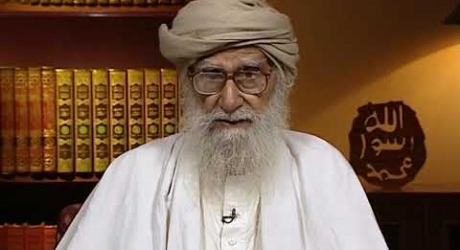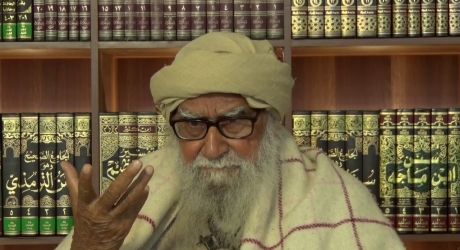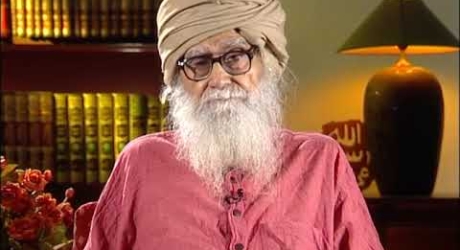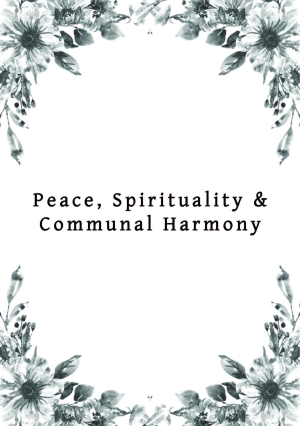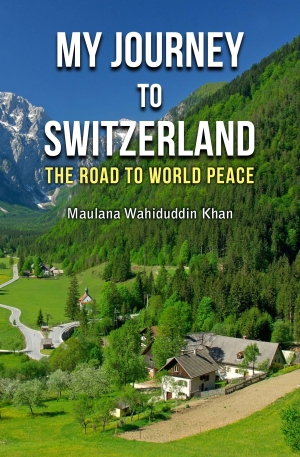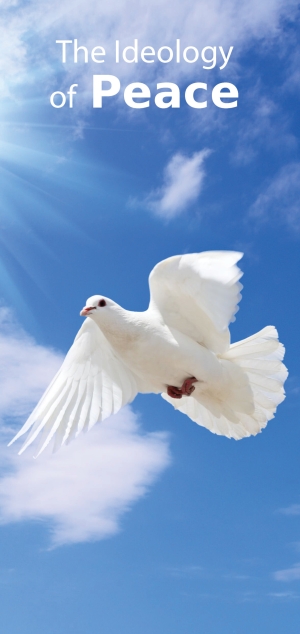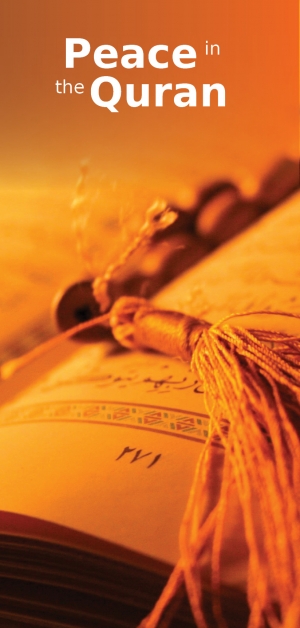Pacifism is a policy subscribed to by those who find war and its attendant evils abhorrent—violence, destruction, loss of life, and in particular, the disruption of everyday existence. The law of nature maintains that peace and pacifism can be attained only on a unilateral and not bilateral basis. First, we must unilaterally abandon confrontational methods such as political activism, protest-based activism, and human rights activism. It will establish normalcy, which will lead to peace, and peace will open the door to all kinds of opportunities.
Peace can only be established on a unilateral basis without confrontation. Peace for the sake of social justice is not a practicable formula. The only workable formula is peace for the sake of normalcy. Normalcy allows us to plan wisely. Wise planning is non-controversial. It can be done without confronting others, regardless of the section of the society to which they belong. The formula is: Establish a peaceful atmosphere at any cost. It will open opportunities, and availing of these through wise planning, we can achieve success.
Featured Articles
Featured Videos
FAQs
Pacifism is a doctrine subscribed to by those who find war and its attendant evils abhorrent—violence, destruction, loss of life, and in particular, the disruption of normal existence. From the earliest times, peace has been a subject of compelling interest and study for all thinking people. Right from Aristotle to St. Augustine, from Bertrand Russell to Mahatma Gandhi, great minds have been preoccupied with this subject and have advocated adherence to the ways of peace. 1937 even saw the publication of an Encyclopaedia of Pacifism, yet a generally acceptable formula for establishing peace has still to be developed.
The law of nature maintains that peace can be attained only on a unilateral and not on a bilateral basis. This means that first of all we have to abandon confrontational methods such as political activism, protest-based activism and human rights activism. This kind of unilateralism will establish normalcy, which will lead to peace and peace will open the door to all kinds of opportunities. By wise planning we can achieve the desired goals of social justice and human rights.
Peace can only be established on a unilateral basis without confrontation. Establishing social justice and human rights, it becomes a bilateral issue. We have to fight other groups which we think are responsible for injustice and the violation of human rights. If we start our journey towards this goal, it is bound to lead to confrontation with existing groups. Instead of reaching the desired goal, people will become engaged in violence. We have to evolve a method that will work without confrontation. The achievement of social justice or human rights calls for wise planning. It is not a journey along a highway but through thickets of thorny bushes.
Peace for the sake of social justice is not a practicable formula. The only workable formula is peace for the sake of normalcy. Normalcy gives us the opportunity to plan wisely. Wise planning is non-controversial in nature. It can be done without confronting others, regardless of the section of the society to which they belong. The formula is: Establish a peaceful atmosphere at any cost, it will open up opportunities, and by availing these through wise planning, we can achieve success.
Source: Spirit of Islam February 2016
The Prophet of Islam fully adopted the way of pacifism or non-violence all his life. All his successes were achieved by non-violent methods. There were many issues in Makkah at that time which could have been the subject of clash and confrontation. But the Prophet avoided all such issues, strictly limiting his sphere to the peaceful propagation of his message.
- The first thirteen-year period of the prophethood is called the Makkah period. The method of non-violence, or pacifism, was adopted in the full sense in this phase. Many issues which presented themselves in Makkah could easily have led to confrontations. But the Prophet of Islam, avoiding all such issues, confined himself totally to the sphere of the peaceful propagation of ‘the word of God’. It was as a result of this policy that dawah work in this period could be effectively performed. One of the many benefits of this 13-year dawah work was that in this age all the best individuals who influenced Islamic history were brought into the fold of Islam, for instance, Abu Bakr, Umar, Usman, Ali, etc.
- When the Makkan leaders wanted to wage war against him, the Prophet, declining to retaliate, quietly migrated to Madinah.
Hijrah, in its nature, is, without doubt, an example of non-violent activism. This peaceful strategy enabled the Prophet and his migrant companions, about 200 in number, to build a powerful center of Islam in Madinah. If the Prophet had opted for the way of armed confrontation instead of peaceful migration, perhaps the history of Islam would have begun and ended in Makkah.
- After the emigration, the Prophet’s antagonists waged war unilaterally. The outcome was the bloody pitched battles at Badr and Uhud. At that moment, the Prophet again negotiated a 10-year peace treaty by accepting all the conditions of the enemy. This pact is known in the history of Islam as the Hudaybiyyah peace treaty. This event is called a ‘clear victory’ in the Quran (The Quran, 48:1). It was this peace pact, which paved the way for that peaceful constructive activity that finally made possible the conquest not only of Makkah but the whole of Arabia.
All great successes or victories in the first phase of Islam and in the succeeding period were achieved by the peaceful method.
There is much talk today—as before—about peace and pacifism. That we need an ideology of peace is something every sensible person acknowledges.
People think injustice leads to war, and that, therefore, those denied justice should first be given justice for peace to prevail. This is a flawed concept. You may think you have given justice to someone, but he may not think he has received his just due. And so, he will remain dissatisfied and disgruntled and can easily take to violence. This demand for ‘just peace’ cannot work. It can never result in peace.
The only way to establish peace is to work for peace for its own sake, unconditionally, and not link it with justice or human rights or anything else. Agreeing unilaterally to peace will open doors to many opportunities to progress. Availing these opportunities, one can obtain all those things including justice.
This is the only workable formula for peace and also the formula that Islam recommends. Islam is an ideology of peace and presents this eminently workable formula for peace, yet strangely, Muslims have failed to understand this or convey it to others.
Source: Spirit of Islam August 2015
Let us try to understand why Islam is considered a religion of violence.
Today is the age of media. Before the advent of the modern media there were a large number of people in the world who knew nothing of Islam. With the invention of the printing press and the advent of the electronic media it is difficult to find even a single person, today, who is unaware of it.
But there is a clear-cut difference. In previous ages it happened that wherever Islam spread people were so impressed with it that most of them welcomed it. Strangely enough though, the present day coverage given to Islam has produced only a negative effect due to the negative actions of certain Muslims. People are now generally allergic to Islam rather than being interested in it.
Why are certain Muslims behaving negatively? According to Maulana Wahiduddin Khan, this is due to not knowing the limit of freedom. Modern man aspired to freedom as the highest good, but once having reached this goal, he was unable to set reasonable limits to freedom. In consequence, unrestrained freedom descended into anarchy and lawlessness and all other forms of negativity. Unrest starts at the level of the mind. This happens when people become conditioned to living lives, which are self-oriented instead of God-oriented. As a result of this unrest, they either live in a state of insecurity or isolate themselves from society, or in other ways become negative in their reactions. Some go to the extent of taking the law into their own hands, which results in chaos, violence and even global terrorism.
The tragedy of all is that in actuality, it is no exaggeration to say that Islam and violence are contradictory to each other. The concept of Islamic violence is so obviously unfounded that prima facie it stands rejected. The fact that violence is not sustainable in the present world is sufficient indication that violence as a principle is quite alien to the scheme of things in Islam. Islam claims to be an eternal religion and, as such, could never afford to uphold any principle, which could not stand up to the test of time. Any attempt to bracket violence with Islam amounts, therefore, to casting doubt upon the very eternity of the Islamic religion. Islamic terrorism is a contradiction in terms, much like 'pacifist' terrorism. And the truth of the matter is that, all the teachings of Islam are based directly or indirectly on the principle of peace."
Source: The Age of Peace



